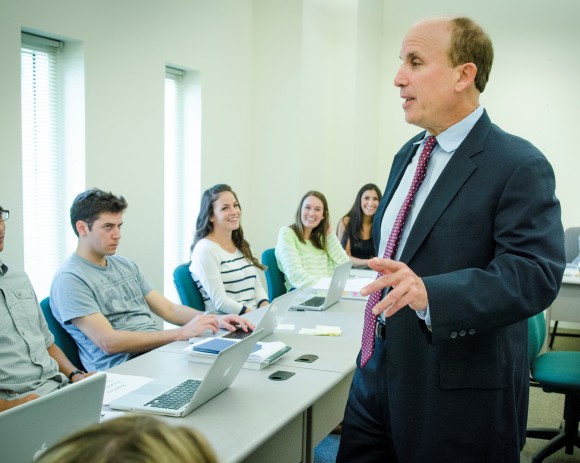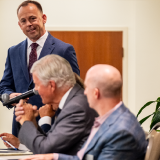Chapman’s Focus on Practical Skills Training is Featured in the Daily Journal
October 4, 2013

David H. Gibbs, a transactional skills professor at Chapman
University’s Fowler School of Law, instructs one of the many
courses at law schools nationwide that aim to teach students
practical skills through experience.
Adding to our strong and rigorous existing doctrinal courses, the Fowler School of Law has begun to implement a thoughtful practical skills program that will help bridge the gap between law school and practice. Commencing with an anticipated start date of fall 2014, every second year law student will be required to take a 3-unit course in transactional skills. In addition, all entering first year students will be required to take a 1-unit Civil Procedure Skills Lab component to complement the existing 5-unit first year Civil Procedure doctrinal courses.
The Los Angeles Daily Journal recently highlighted some of the other important changes that are coming our way:
“Chapman intends to blend the practical with the doctrinal in many courses, Campbell said, by hav[ing] practicing lawyers team-teach the courses with regular faculty. That will be “unique and very helpful educationally,” the dean said – and may also help some graduates find jobs with the practitioner-teachers.”
Beginning in spring 2014, several law school faculty members will partner with accomplished and highly respected practicing attorneys to provide upper level practice components to augment traditional courses. For example, in conjunction with Professor Susanna Ripken’s Securities Regulations course, Thomas Crane, a former Rutan & Tucker managing partner, will offer a weekly practice lab providing critical drafting and counseling skills required of all securities lawyers. The lab faculty will coordinate with existing full time professors to create simulated lawyer work product that correlates with substantive lectures. Of note, the lab courses will be in addition to the required credits needed to complete the companion doctrinal course.
Why the change in focus? Because the legal workforce increasingly seeks graduates that are ready to hit the ground running. In addition to offering hands-on transactional and litigation classes, Chapman’s law students can participate in six legal clinics where they gain real-world courtroom experience, client counseling and/or legal writing experience from actual cases and working with real clients. The goal is to enable students to develop the knowledge, skills and values to become effective, ethical and reflective practitioners.
“I feel incredibly lucky to have the opportunity to develop and help implement the program that Chapman has adopted,” said Professor David Gibbs. Professor Gibbs began at Chapman in Fall 2013 and is already taking the lead on teaching practical skills to his students. “I want to help students develop the tools that will enable them to not only be ready to practice but also guide them over their careers,” he said.
This new focus on practical skills classes can already be seen at Chapman. In super sports agent Leigh Steinberg’s class, students are expected to learn everything from mediation to public relations. “This class [is] extremely interactive and emphasize[s] real life skills,” Steinberg wrote in a Forbes article. Students can also take practical skills electives such as trial advocacy, pre-trial civil practice and a course on California law and motions.
Laws, legal processes and economic conditions are always transforming and it’s important that law schools transform themselves to stay ahead of the curve. The faculty members at Chapman are committed to teaching cutting-edge practical skills to our students. “The faculty and deans had the courage to take the initiative to improve what is already an outstanding curriculum,” said Professor Gibbs. “The plans for Chapman‘s Fowler School of Law are unique and incredibly exciting.”
